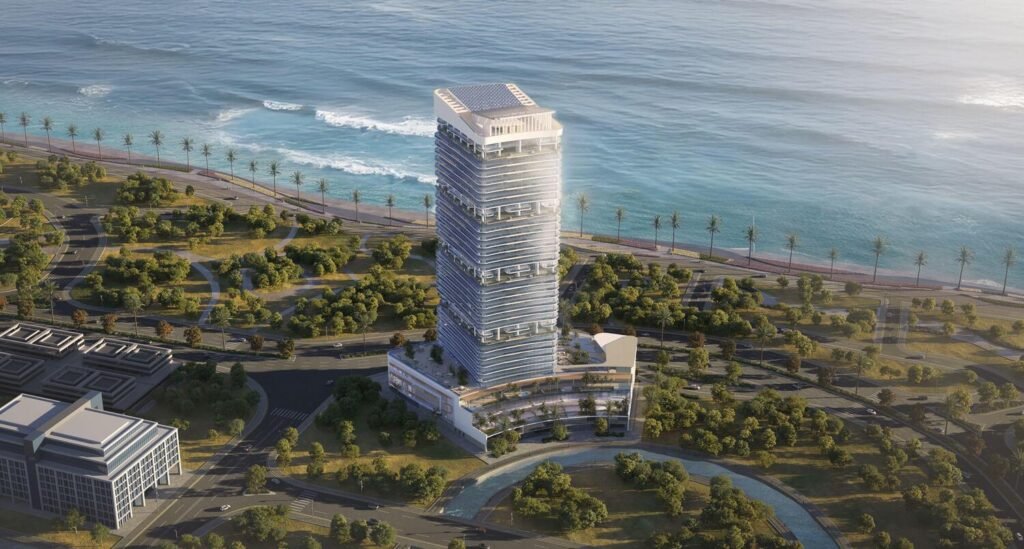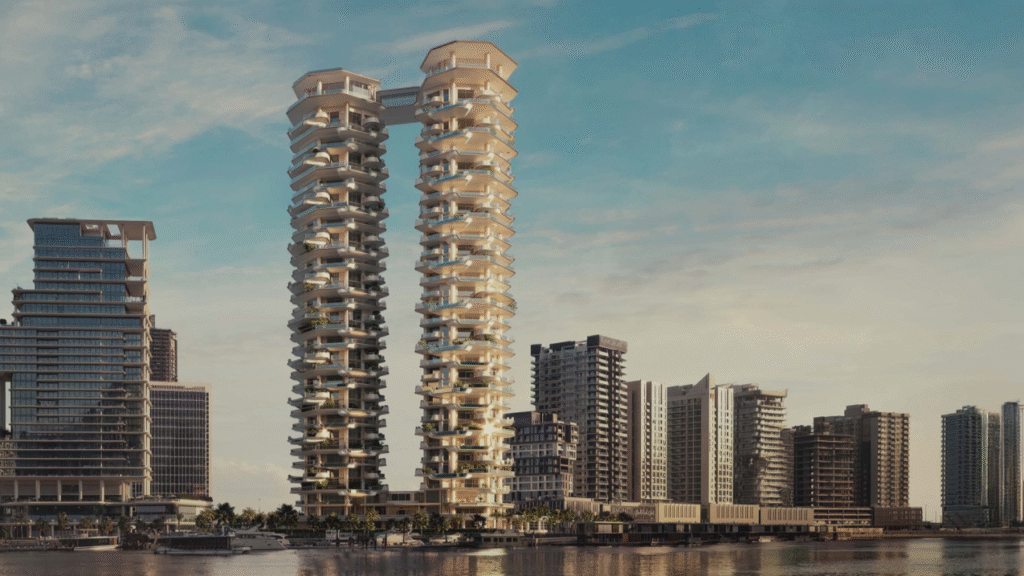The internet is full of success stories of investors earning golden mountains from Dubai's fast-growing real estate market. One statement comes up remarkably often: "If I buy property in Dubai I don't have to pay tax!"
But what about Dubai property tax for Dutch investors? In this in-depth article, we unravel the myths, explain the tax reality and show how you can profit virtually tax-free without running unnecessary risks.
1. Where does the myth come from?
Dubai is known worldwide as a tax-friendly emirate. Indeed, you pay no income tax and no capital gains tax. Those headlines are true-but they only tell half the story.
"While it is true that in Dubai you do not pay tax on the growth in value of your property or your rental income, you do have to report your property to the Dutch tax authorities." - Hugo Li Cheng Hu, founder of House of Orange Real Estate
For a local resident or a company operating only in the United Arab Emirates (UAE), the tax burden may be literally zero. However, as a Dutch tax resident, you are subject to the rules of the tax authorities' game. Those who ignore these risk hefty fines.
2. What taxes are there in Dubai?
Dubai features for individuals no:
- Income tax on rental income
- Capital gains tax on the sale profit of a property
- Periodic property tax (OZB)
You do pay:
- Registration fee on transfer (4 % of the purchase price)
- Service costs for communal facilities (depending on the project)
- VAT of 5 % on services such as brokerage commission (not on purchase price of residential property)
For many international investors, this fiscal climate is an important motive for investing. But it is Dubai-plate. Your tax residence state looks further.
3. Dubai property tax for Dutch nationals
The Netherlands applies a so-called world income principle: you declare all your income and assets worldwide. For property abroad, this usually comes in box 3 justified (capital gains tax).
3.1 Valuation in box 3
- Value date: 1 January of the tax year
- Basis of valuation: market value or purchase price minus debts (e.g. a local mortgage)
- Tax-free assets: €57,000 p.p. (2025)
- Flat returns: tariff bands from 1.8 % to 6.04 % (2025)
- Tax rate: 32 %
With the planned revision of box 3 (effective date postponed to 2027), the Netherlands is shifting towards tax on actual return. That will make reporting for foreign properties even more data-intensive.
3.2 Information requests & fines
Through international data exchange, the tax authorities are increasingly receiving information about Dutch investors with property in the UAE. Those who fail to declare their property may face a penalty fine get from 75 % to 150 % of the evaded tax, plus interest. In serious cases, criminal charges will follow.
4. Netherlands-UAE tax treaty: your lifeline
Since 2009, there has been a tax treaty between the Netherlands and the UAE. This treaty prevents double taxation and distributes taxing rights. In practice, this means for your Dubai property tax:
- Primary taxing right with Dubai (but that raises zero).
- The Netherlands is allowed to calculate your box 3, but must have a exemption apply according to the so-called "exemption method".
- As a result, you pay only a small part of the regular Box 3 levy; in some situations even nothing.
Briefly: those who declare property neatly can often reduce the Box 3 burden to a few per mils-provided the return is set up correctly.
5. Bank account in Dubai? Don't forget CRS
For purchase and rent collection, most investors open a bank account in Dubai. You also count these in Box 3. Moreover, since 2017, the Common Reporting Standard (CRS) applies: banks in the UAE report the balances of foreign account holders. The chances of hidden balances going undetected are zero.
6. Calculation case: flat in Dubai Marina
Suppose you buy a 1-bedroom flat of €400,000. Funding: 50 % equity, 50 % mortgage with Emirates NBD.
| Post | Amount |
|---|---|
| Purchase price | € 400.000 |
| Registration & costs purchaser (5 %) | € 20.000 |
| Equity | € 200.000 |
| Mortgage | € 200.000 |
| Annual rental income | € 32.000 |
| Service costs | € 4.800 |
Dubai tax:
- Income tax = 0
- Capital gains tax (on sale) = 0
Netherlands box 3 - 2026 declaration (reference date 1-1-2026):
| Component | Value |
| Market value flat | € 420.000* |
| Mortgage debt | - € 200.000 |
| Net basis | € 220.000 |
| Flat rate of return | ± € 6.600 |
| Box 3 tax 32 % | ± € 2.112 |
| Treaty exemption (90 %)* | - € 1.900 |
| Net tax | ± € 212 |
* Assuming 5 % market growth. The treaty exemption varies by situation; 90 % is a common outcome.
The example illustrates that Dubai property tax after deducting treaty exemption often amounts to several hundred euros a year - a fraction of the gross return.
7. Five tax pitfalls (and how to avoid them)
- Failure to report
The biggest mistake is concealment. By CRS, the chances of getting caught are high. - Misvaluation
Use the correct exchange rate and current market value. A valuation report may be required. - Double deduction of mortgage interest
Mortgage interest is not deductible in Box 3; only the debt reduces the basis. - No will or DIFC-Will
Without a will, Sharia inheritance law applies. This may surprise heirs. - Misapplication of the Convention
Have a specialist assess whether you are calculating the exemption correctly.
8. Tips to minimise property taxes in Dubai
- Structuring via BV or SPF
In some cases, a Dutch holding company-BV or a Foundation Private Fund in Abu Dhabi-offers additional flexibility. - Spread timing of payments
Pay in instalments around year-end to reduce the box 3 value on 1 January. - Opt for off-plan projects
During construction, only the part paid is taxed; the rest is not yet taxed. - Optimise currency risk
An AED account shields fluctuations and lowers the euro base. - Work with an RERA-certified partner
House of Orange Real Estate ensures correct contracts and reports.
9. Checklist before you sign
- Check declaration history: property already added?
- Mortgage terms scan for CRS clauses
- Request valuation or RERA valuation
- Getting wills/ DIFC-Will drawn up
- Get exemption method calculated
- Checking service, maintenance and sink fund forecasts
- Verify official RERA-licensed broker
10. Conclusion: myth debunked, opportunities preserved
It is a fact that Dubai itself does not levy personal income or wealth taxes. Nevertheless, it is incorrect to say that you totally does not pay tax. Dubai property tax does exist for Dutch residents, albeit in greatly reduced form thanks to the tax treaty. Those who report transparently and choose the right structures can enjoy returns of up to 8-10 % with minimal tax burden.
Core message: Invest knowledgeably, follow the rules and take advantage of the treaty. This will keep Dubai's promise - high rental income, value growth and a clear tax regime - intact.
Customised advice? Get in touch
Every financial situation is unique. Want to know the tax implications for your portfolio? Contact us directly with House of Orange Real Estate. Our in-house tax and real estate experts will help you map out the optimal route.



